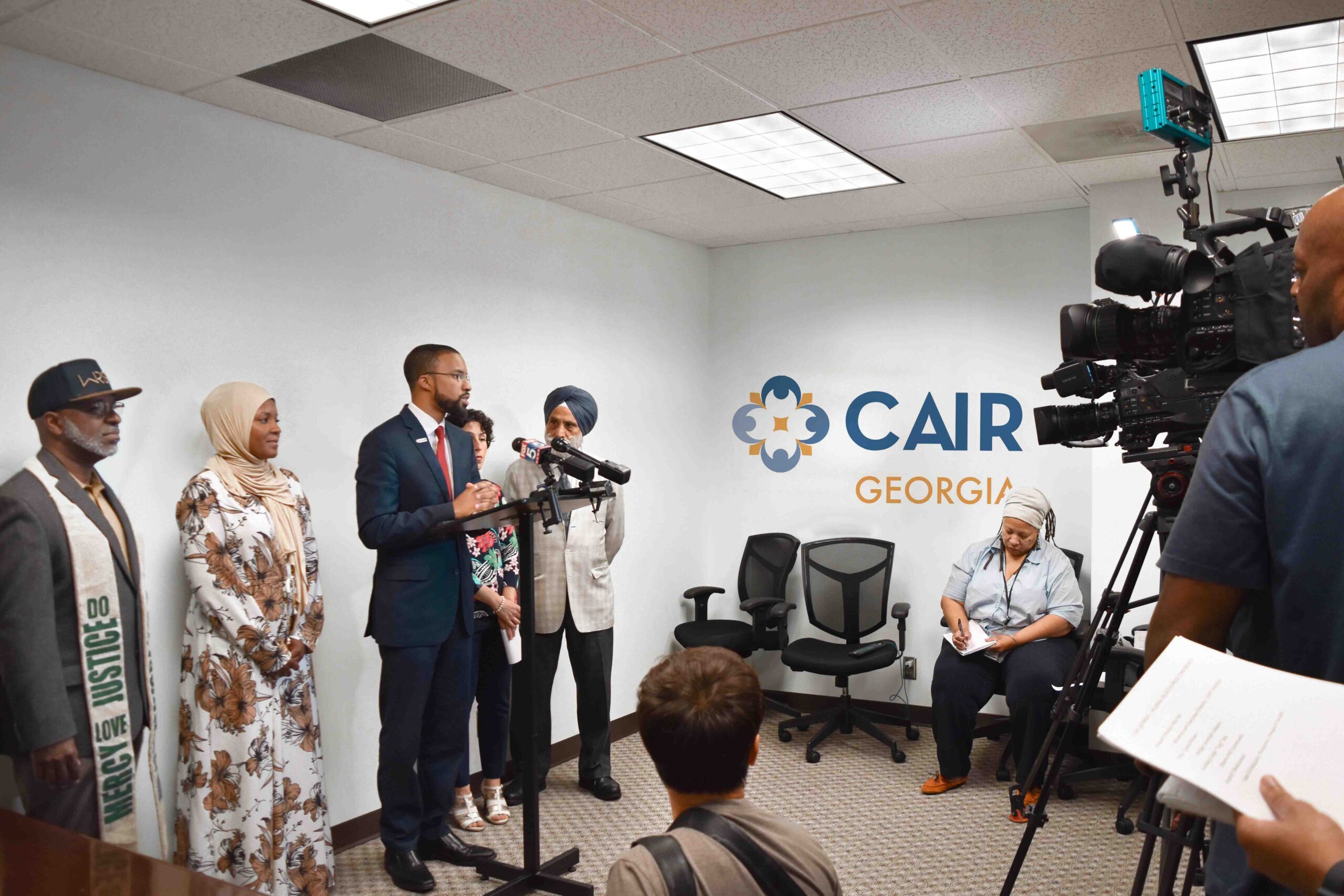 (ATLANTA, GA, 5/15/2019) – On Wednesday, May 15th, the Georgia chapter of the Council on American-Islamic Relations (CAIR-Georgia) held a press conference in Atlanta to announce the filing of a state discrimination complaint against the Department of Corrections, which has violated the law by banning Ms. Jalanda Calhoun, a female Muslim correctional officer, from wearing a hijab at work.
(ATLANTA, GA, 5/15/2019) – On Wednesday, May 15th, the Georgia chapter of the Council on American-Islamic Relations (CAIR-Georgia) held a press conference in Atlanta to announce the filing of a state discrimination complaint against the Department of Corrections, which has violated the law by banning Ms. Jalanda Calhoun, a female Muslim correctional officer, from wearing a hijab at work.
SEE: AJC: Muslim Woman Files Complaint After Georgia Bans Her From Wearing Hijab
SEE: FOX: Georgia Officer Asks Gov. Kemp for Help After State Agency Bans Her Hijab
(Photo for Public Use: Sawsan Selim/CAIR-GA)
During the May 15th press conference, Ms. Calhoun delivered remarks alongside speakers from other religious communities, including the Sikh community, who could also be banned from wearing religious headgear under the Department’s policy.
“Right now, American Muslim women can wear hijabs while serving as soldiers, police officers, medics, and other public service roles. Yet the State of Georgia is denying a Muslim woman her constitutional right to wear a hijab while serving the state prison system,” said Edward Ahmed Mitchell, Executive Director of CAIR Georgia. “The state’s ban on hijabs makes no sense, violates the law, and must not stand.”
On May 13th, CAIR-Georgia filed a legal complaint on behalf of Ms. Calhoun against the Department with the Georgia Commission on Equal Opportunity, which investigates discrimination at state agencies.
CAIR Georgia is also calling on Georgia Governor Brian Kemp to intervene, overturn the Department’s decision, and issue an order permitting all state employees to wear Islamic hijabs, Jewish kippas, Sikh turbans, and other religious clothing that does not interfere with their job responsibilities.
SEE: Letter to Governor Kemp Seeking Executive Order
In January, Ms. Calhoun informed the Department of Corrections that she planned to wear a hijab as part of her sincerely religious beliefs, and began doing so shortly thereafter.
After Ms. Calhoun had worn a hijab for three weeks without incident, the Department sent her a letter banning her from wearing a hijab. Among other reasons, the letter states that the “grooming standard for female correction officers requires that your ear lobes must be visible.”
SEE: Department Letter Denying Right To Wear Hijab
The prison warden also told Ms. Calhoun she would not be allowed to stay on-duty unless she immediately removed her scarf.
Under apparent threat of termination, Ms. Calhoun removed her scarf and sought help from CAIR-Georgia. In the weeks afterward, CAIR-Georgia and the Department of Corrections have engaged in negotiations regarding the prison’s policy, but were unable to reach agreement.
CAIR offers a booklet, called “An Employer’s Guide to Islamic Religious Practices,” to help employers gain a better understanding of Islam and Muslims in the workplace.
CAIR: An Employer’s Guide to Islamic Religious Practices
The Washington-based Muslim civil rights organization has reported an unprecedented spike in bigotry targeting American Muslims and members of other minority groups since the election of Donald Trump as president.
CAIR is America’s largest Muslim civil liberties and advocacy organization. Its mission is to protect civil liberties, empower American Muslims, and build coalitions that promote justice and mutual understanding.
La misión de CAIR es mejorar la comprensión del Islam, fomentar el diálogo, proteger las libertades civiles, capacitar a los musulmanes estadounidenses, y construir coaliciones que promuevan la justicia y la comprensión mutua.

